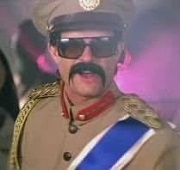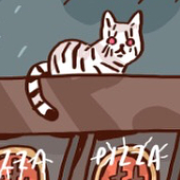|
So on the Western Front in World War one, was serving in the Royal Flying Corps always a volunteer position, or did people get assigned to it? (Feel free to answer this for any other Air force of the time because I'm curious now that it has come up, but I'm focused on the RFC.)Jobbo_Fett posted:Do you mean the compressed air tanks? No, the propellant tanks. Apparently the idea of using pressurized tanks as structural members was an idea that predated Germany's liquid fueled rocket research; it wasn't used in the V-2 because it was reckoned it would take too much development time. I'm impressed if the idea got used elsewhere.
|
|
|
|

|
| # ? Jun 10, 2024 14:01 |
|
Right, wasn't sure because my mind was stuck on the air. Will keep an eye out for any mentions.
|
|
|
|
I can understand the chinese government not being good at getting money out of trade or even not understanding it since the theories on why trade is good as opposed to hording just as much specie like the concept of mercantilism promotes, as if the raw amount of silver is the thing from which all value derives. It just fundamentally feels off when people say that the world at large had nothing any chinese people wanted, because want is infinite, and there's always going to be somebody who can make something cheaper, something that won't grow natively, or some weird thing that nobody in the domestic market's doing. I know for a fact that China's unwanting populace embraced peppers and potatoes when european explorers brought them back from the new world, even though it wasn't necessarily european merchants who brought them to China.
|
|
|
|
There is also a thing where merchants were seen as the lowest possible social caste and they might not have been predisposed to try to have society actually benefit from them because that would conflict with the idea they're just parasites who make money without actually producing something of value.
|
|
|
|
I'd take some of that with a grain of salt because they're Confucian/Neo-Confucian rhetoric generally used to promote said values and uplift the state, etc. China clearly did value things from beyond its borders like warhorses suited for cavalry, sometimes along with the mounted warriors themselves, sometimes just the horses. They'd usually get these through "trade" that was basically couched in terms of tribute and such. My personal take is that the dominance of Confucian rhetoric meant that when the various Chinese dynasties did conduct trade and such, they tended to couch it in terms that were more respectable to them. This meant reciprocal trades that tended to view things as tribute, with the little brother (often China's neighbors, not always) giving the big brother a worthy gift, and the big brother (China, not always) receiving it and rewarding their little brother with their own gift.
|
|
|
|
An addendum to that is ideally the gift China gave back is much larger in order to showboat the power of the state and to downplay the insignificance of the tribute they got as something they don't really need.
|
|
|
|
HEY GUNS posted:empires of the weak is a book that came out this year and suggests we're all completely wrong about this, but i haven't read it yet
|
|
|
|
Nebakenezzer posted:So on the Western Front in World War one, was serving in the Royal Flying Corps always a volunteer position, or did people get assigned to it? (Feel free to answer this for any other Air force of the time because I'm curious now that it has come up, but I'm focused on the RFC.) The RFC (and the RNAS) expanded from its pre-war establishment via targeted recruitment and abstraction of skilled tradesmen as ground crew in the same way that those men were identified and specifically recruited into other mechanical and engineering positions. Until 1916 there were only wide-scale opportunities for transfer in as flying crew for officers with a civilian pilot's ticket, although some were able to get in as wireless operators or observers and then retrain; towards the back end of the Somme, things were relaxed and they started training pilots from scratch (for a given definition of "training"). New flying crew without existing piloting skills came mostly by seconding officers from the wider Army; they would learn to fly by going up as observers and then be trained as pilots later. As the war went on the Army began directly recruiting all grades into the RFC and initially training them for flying duties instead of general service, as well as taking transfers and secondments. I don't think it was ever necessary to do wide-scale forcible transfers to the RFC, going tiddly-up-up has always been a Gucci job and there's always been more applicants than posts ("there's nothing cushy about life in the Women's Auxiliary Balloon Corps!", especially when it means you get to live in a shed instead of a hole in the ground), but there are isolated stories of canny or well-connected battalion commanders bouncing a useless or unpopular officer into applying for the transfer with a glowing recommendation and thus making him someone else's problem, in classic style. There were also written examinations and medical tests before anyone was accepted, the stringency of which varied depending on how many flyers had been shot down recently. (The Blackadder depiction of how to get into the RFC and the inadequacy of the training is one of the many things in that series which are satirically inaccurate in detail, but accurate in spirit.)
|
|
|
|
The Qing opened up the Canton trade originally to pay for its wars- the idea was silver for goods, and it was generally mutually beneficial. The main problem is the price of silver skyrocketed as Mexican production declined, and it made the trade a lot less favorable for the merchants involved in it. The pressure to smuggle was less from the EIC than from the other traders. Unfortunately, this commercial engagement made the wars worse, and contributed to a death spiral as the imperial government needed more and more silver to fight more and more wars until it was flat broke and gave the authority to provincial governors instead, which rendered the Qing empire mostly helpless against actual unified countries, and helped lead to the warlord era.
|
|
|
|
Panzeh posted:The Qing opened up the Canton trade originally to pay for its wars- the idea was silver for goods, and it was generally mutually beneficial. The main problem is the price of silver skyrocketed as Mexican production declined, and it made the trade a lot less favorable for the merchants involved in it. The pressure to smuggle was less from the EIC than from the other traders. There's been a fair amount of scholarly pushback on that last idea, as there was a lot of political and military reform (not always sucessful, obviously) in the four decades between the defeat of the rebellions and the 1911 revolution such that it's not so easy to draw a straight line.
|
|
|
|
SlothfulCobra posted:I can understand the chinese government not being good at getting money out of trade or even not understanding it since the theories on why trade is good as opposed to hording just as much specie like the concept of mercantilism promotes, as if the raw amount of silver is the thing from which all value derives. Mercantilism isn't nearly as stupid an idea as it is often portrayed. If you have a currency that is made of silver then you need to run a trade surplus in silver to maintain your money supply in the face of economic and population growth and hoarding. Access to ready money allows faster and more efficient economic growth than relying on credit. Mercantilists weren't just pursuing a "more gold good" policy. They were concerned with money supply. The very earliest mercantalist writers based their policies on the idea that lack of access to specie was hampering merchants. James Steuart, who was one of the last major mercantalist thinkers, was primarily focused on preventing hoarding and accumulation of gold by individuals, and advocated radical inflationary policies and taxation to keep money circulating. So to bring it back to the Chinese, the problem that they had was a shortage of silver (because of the failure of the paper money system during the Ming). So they were importing silver in huge quantities from Japan and Mexico. It wasn't that they didn't want anything else. They just didn't need anything else as much as silver. Mr Enderby fucked around with this message at 21:55 on Nov 5, 2019 |
|
|
|
Trin Tragula posted:The RFC (and the RNAS) expanded from its pre-war establishment via targeted recruitment and abstraction of skilled tradesmen as ground crew in the same way that those men were identified and specifically recruited into other mechanical and engineering positions. Until 1916 there were only wide-scale opportunities for transfer in as flying crew for officers with a civilian pilot's ticket, although some were able to get in as wireless operators or observers and then retrain; towards the back end of the Somme, things were relaxed and they started training pilots from scratch (for a given definition of "training"). Cool, thanks. I'm still plugging away at my "every two weeks post" [deadline missed by 2.5 months] so I was wondering how Arthur Whitten Brown went from a Lt. on the Ground to an observer for the RFC. He basically sticks around for the second battle of Ypers, then goes flying! I mean what's up with that? Also, came across this little gem on the Fokker Eindecker: quote:Fuel system details and flight characteristics
|
|
|
|
We tend to criticize the Japanese and Germans for not cycling their best pilots out to train up replacements but if you're starved for planes and gas wouldn't putting your best foot forward be the best course of action? If you have a small number of flyable planes and few if any replacements, why wouldn't you pair them with your best pilots?
|
|
|
|
Milo and POTUS posted:We tend to criticize the Japanese and Germans for not cycling their best pilots out to train up replacements but if you're starved for planes and gas wouldn't putting your best foot forward be the best course of action? If you have a small number of flyable planes and few if any replacements, why wouldn't you pair them with your best pilots? It made perfect sense considering their strategic approach and resource limitations, particularly for the Japanese. The issue for both wasn't ever really airframes, it was training resources...particularly fuel. The RAF used a very similar approach for the same reasons, with the same reaction when the press for new pilots became acute. Later on the RAF had the breathing room to dramatically increase their training hours as they weren't losing pilots at the severe rate the Japanese and Germans were. bewbies fucked around with this message at 00:07 on Nov 6, 2019 |
|
|
|
Milo and POTUS posted:We tend to criticize the Japanese and Germans for not cycling their best pilots out to train up replacements but if you're starved for planes and gas wouldn't putting your best foot forward be the best course of action? If you have a small number of flyable planes and few if any replacements, why wouldn't you pair them with your best pilots? In the short term it makes sense. In the long term you are wasting the resources spent manufacturing and supplying replacement aircraft. Since by skimping on pilot training they are easily shot down by the better skilled enemy pilots. All those precious planes and gas crash and burn with your poorly trained pilots.
|
|
|
|
I wonder how things shift now, with cheap-to-run simulators but even more complicated aircraft?
|
|
|
|
Mr Enderby posted:So to bring it back to the Chinese, the problem that they had was a shortage of silver (because of the failure of the paper money system during the Ming). So they were importing silver in huge quantities from Japan and Mexico. It wasn't that they didn't want anything else. They just didn't need anything else as much as silver. There's an interesting history related to the supply of silver and late medieval/early modern Middle Eastern economies, now by the high/late Middle Ages the states inthe Middle East had poor access to silver and had actually come to rely upon Italian merchants (Venetian, Genoese, etc.) to provide silver (both specie and minted coins)* for their economies. As I recall it the Italians themselves acquired most of their silver from trading Asian goods acquired in the Eastern Mediterranean on the markets in Western Europe, particularly in Champagne. However as other European nations began to divert more and more Asian trade around Africa there was now less to be bought in the Eastern Meditteranean and much tougher competition in Western Europe making it harder for the Italian merchants to sell their goods there. The end result was essentially a drying up of a major source of supply of silver for the Ottoman Empire (which now dominated the entire Eastern Mediterranean) which had pretty drastic effects for commerce and for the state which had relied upon money to pay its soldiers, both directly in the case of salaried soldiers such as the Janissaries and indirectly for soldiers maintained by the tax-revenue from land-grants such as the Timar fiefs, which precipated a crisis as the soldiers maintained by these were the backbone of the Ottoman army and by the late 17th/early 18th century many of them could simply no longer afford to equip themselves (this is also probably part of the reason why the Janissaries came to mingle so much with the urban craft guilds, with many taking jobs as craftsmen when their salaries either couldn't be paid out in full or they were paid in debased/devalued coins, though this, like the whole concept of "Janissary corruption" is very much a complicated and multifaceted story that too often gets oversimplified in most histories). *There's actually an interesting story from the late Middle Ages where the Venetians (I believe) actually minted coins with Islamic iconography to be used for trade in the Mamluk Sultanate (with who they had a privileged trading position), though they eventually had to stop when the Pope called them out on it.
|
|
|
|
The Lone Badger posted:I wonder how things shift now, with cheap-to-run simulators but even more complicated aircraft? What specifically do you want to know? Even without the simulators, I'm pretty sure that a USAF pilot gets an insane amount of hours compared to his WWII-equivalent in trwinint but that's a broad overgeneralization
|
|
|
|
Randarkman posted:However as other European nations began to divert more and more Asian trade around Africa there was now less to be bought in the Eastern Meditteranean and much tougher competition in Western Europe making it harder for the Italian merchants to sell their goods there. The end result was essentially a drying up of a major source of supply of silver for the Ottoman Empire (which now dominated the entire Eastern Mediterranean) which had pretty drastic effects for commerce and for the state which had relied upon money to pay its soldiers, both directly in the case of salaried soldiers such as the Janissaries and indirectly for soldiers maintained by the tax-revenue from land-grants such as the Timar fiefs, which precipated a crisis as the soldiers maintained by these were the backbone of the Ottoman army and by the late 17th/early 18th century many of them could simply no longer afford to equip themselves (this is also probably part of the reason why the Janissaries came to mingle so much with the urban craft guilds, with many taking jobs as craftsmen when their salaries either couldn't be paid out in full or they were paid in debased/devalued coins, though this, like the whole concept of "Janissary corruption" is very much a complicated and multifaceted story that too often gets oversimplified in most histories). This is really interesting, thank you. The early modern silver trade is so interesting, because it's completely global. I wonder if the Ottoman silver shortage/devaluation is the reason for the popularity of the Maria Theresa thaler across the Ottoman periphery. MTTs were in regular use in Ethiopia and the Red Sea until after the second world war. Randarkman posted:*There's actually an interesting story from the late Middle Ages where the Venetians (I believe) actually minted coins with Islamic iconography to be used for trade in the Mamluk Sultanate (with who they had a privileged trading position), though they eventually had to stop when the Pope called them out on it. The eighth century English king Offa had a coin minted with the arabic for "there is one god and allah is his prophet"* on it. As far as I know it wasn't for use with arab trade partners though. It was just that they used a lot of arab currency, and so that little bit of script was associated with sound money. In medieval southern europe there's a type of illegible decoration called pseudo-kufic, that gets scattered around on coins to make them look like they have arabic writing on them, and later ends up in decorations, and particularly in religious paintings during the Italian renaissance. *I looked up the coin, and it says "There is no God but Allah alone", but with minor errors. Also the sentence is written upside down. https://www.bl.uk/collection-items/gold-dinar-of-king-offa Mr Enderby fucked around with this message at 13:31 on Nov 6, 2019 |
|
|
|
Mr Enderby posted:The eighth century English king Offa had a coin minted with the arabic for "there is one god and allah is his prophet" on it. As far as I know it wasn't for use with arab trade partners though. It was just that they used a lot of arab currency, and so that little bit of script was associated with sound money. this is loving cool, thank you for posting about it!
|
|
|
|
The Lone Badger posted:I wonder how things shift now, with cheap-to-run simulators but even more complicated aircraft? A modern war between say, the US and Russia would be nasty, brutish, and short. MrYenko fucked around with this message at 14:45 on Nov 6, 2019 |
|
|
|
MrYenko posted:A modern war between would be nasty, brutish, and short.
|
|
|
|
vuk83 posted:Excluding nukes why? remember how the EU ran out of PGMs in Operation Bomb Useless Dirt: Libya Edition?
|
|
|
|
Equipment reserves, most likely. Modern military equipment is both expensive and complicated to produce compared to older stuff, the vehicles far more so than the vehicle killers. And while you could theoretically make older and simpler tanks quicker, they're basically fodder against modern weapons.
|
|
|
|
vuk83 posted:Excluding nukes why? Waving the magic no-nukes-wand, both of our military capabilities are extraordinarily effective, but of limited depth compared to what weíve seen in the past. High intensity combat operations would have clear (and horribly bloody) results, but would likely leave even the victor in rough shape, materially. Neither side has the reserves of munitions and spares that we used to. The initial formations are pretty uniformly much smaller, as well. Which is of course, related to nukes. Nuclear weapons ensure that we donít have to keep enormous conventional militaries, because existential threats to a nuclear power have -so far- very rarely been made.
|
|
|
|
I think its a pretty questionable assumption that hostilities would cease just because PGM magazines are depleted.
|
|
|
vuk83 posted:Excluding nukes why? This kind of total war scenario between opponents with the latest technology and large militaries hasn't really happened since World War II. We've spent most of our time in low-intensity skirmishes and anti-insurgency operations, which means we've never seen just what a peer opponent could do. Basically, modern technology has gotten really good at killing. Aircraft, artillery, and naval vessels can easily strike beyond visual range with the aid of guided missiles and drone artillery spotters, as well as just plain drones dropping bombs. Massing your army as you did in the old days is virtually impossible because you'd almost immediately be spotted and quickly end up within range of something that can drop a ton of explosives on it. A tank traveling in the open can be blown up before it even sees what shot at it. Aircraft are detected on radar and have missiles fired at them from over the horizon. Now, imagine that both sides can do that. The only realistic way to win is to be the first one to deliver devastating blows that destroy as much of the enemy as possible. One of the reasons we're so afraid of nukes is that they're the simplest option for doing that, especially smaller tactical nukes, and even a single small detonation could be enough to trigger MAD.
|
|
|
|
|
bewbies posted:I think its a pretty questionable assumption that hostilities would cease just because PGM magazines are depleted. Iím not saying hostilities would cease. Iím saying things would devolve rather rapidly as a lack of munitions (but more probably) spares reduced the ability of both sides to keep up the pace of operations. The US probably has a huge advantage here against any possible opponent, simply by virtue of its expeditionary logistics capability, but itís not immune.
|
|
|
|
Taerkar posted:Equipment reserves, most likely. Modern military equipment is both expensive and complicated to produce compared to older stuff, the vehicles far more so than the vehicle killers. And while you could theoretically make older and simpler tanks quicker, they're basically fodder against modern weapons. More complex, sure, but manufacture has also advanced leaps and bounds since WW2. The problem isn't the added complexity, but that virtually nothing in a military arsenal is used enough to warrant full scale production outside wartime.
|
|
|
|
Predictions of "short" wars (and associated assumptions) have something of a mixed historical record. That said the first 72 hours of a shooting technowar will really be something.
|
|
|
|
I've read quite a bit about the Donbass conflict to get an insight into what a full-scale modern combat been states could look like. The results were: 1) Artillery is still king, super accurate, and deadly as gently caress. Drones will be used to focus artillery with pinpoint accuracy. https://mwi.usma.edu/russian-ukrainian-war-understanding-dust-clouds-battlefield/ 2) electronic warfare and cyber attacks will be absolutely critical https://www.reuters.com/article/us-...t-idUSKBN14B0CU Also mechanized forces are still a critical component, but insurgents (or defenders in general) also have many ways to take them out. Granted the Donbass is a very limited conflict, where airpower was minimized which makes it fascinating to look into. With that said, any full-scale peer conflict sans nuclear weapons would come down to who can achieve air supremacy so drones, bombers, surveillance planes ect can be deployed at will.
|
|
|
|
bewbies posted:I think its a pretty questionable assumption that hostilities would cease just because PGM magazines are depleted. Anyone up for a game of Twilight: 2000?
|
|
|
|
really interesting about the donbass. when Russia rolled over Georgia in 2008 did they have artillery spotting drones back then, or is that a new thing under the sun?
|
|
|
|
oystertoadfish posted:really interesting about the donbass. when Russia rolled over Georgia in 2008 did they have artillery spotting drones back then, or is that a new thing under the sun? They did not...ironically enough it was Georgia's relatively effective use of drones that prompted renewed Russian interest in using them as targeting platforms. Obviously using drones (or any aerial observation thing) as a targeting platform isn't anything new; the big difference now is how quickly targeting data can make it to the shooters.
|
|
|
|
So what happens when somebody man-in-the-middles the drone feeds and starts redirecting artillery on the owner's own troops? Do we switch back to kids with radios who know how to read maps and have hard to fake accents?
|
|
|
|
Solaris 2.0 posted:2) electronic warfare and cyber attacks will be absolutely critical That whole story very possibly didn't happen and was Crowdstrike jumping to conclusions. https://web.archive.org/web/2017070...ed-820960bbb02d
|
|
|
|
The predictions I've seen are all about the renewed supremacy of fire over manoeuvre and the small sizes of modern formations. A modern peer conflict will consist of small forces stumbling around the theatre until they bump into each other and are both annihilated by the other's joint fires. I mean, yes, we'll run out of PGMs eventually, but will we do it before we run out of vehicles?
|
|
|
|
MrYenko posted:Waving the magic no-nukes-wand, both of our military capabilities are extraordinarily effective, but of limited depth compared to what we’ve seen in the past. High intensity combat operations would have clear (and horribly bloody) results, but would likely leave even the victor in rough shape, materially. Neither side has the reserves of munitions and spares that we used to. The initial formations are pretty uniformly much smaller, as well. Weren't there severe materiel issues in WW1 as well? Mainly with artillery shell production? Without modern weapons and PGMs, a war might devolve into static trench warfare again.
|
|
|
|
FrangibleCover posted:The predictions I've seen are all about the renewed supremacy of fire over manoeuvre and the small sizes of modern formations. A modern peer conflict will consist of small forces stumbling around the theatre until they bump into each other and are both annihilated by the other's joint fires. But what about the population centers? What reason would we have to assume that a peer conflict wouldn't involve long-range missile strikes against enemy economic centers? Even if those missiles weren't nuclear they'd still do a hell of a lot of damage.
|
|
|
|

|
| # ? Jun 10, 2024 14:01 |
oystertoadfish posted:really interesting about the donbass. when Russia rolled over Georgia in 2008 did they have artillery spotting drones back then, or is that a new thing under the sun? While aerial artillery spotting isn't new, the ease with which it can be done is. The prevalence of cheap drones with live video feed on the commercial market has given even insurgents aerial spotting capability that was once restricted to proper militaries able to spend millions of dollars per platform. While a DJI can't get to the heights of a Predator or AWACS plane, it's also much smaller and harder to spot (they're about the size of a bird on radar, though their propellers make them recognizable if you can read the micro-Doppler signature) and can be deployed from any building or foxhole. They've also used drones for bomb dropping; again, not as powerful as a plane or artillery but you can now rapidly deploy a bomb powerful enough to take out a vehicle with relative accuracy in urban combat from anywhere. https://www.youtube.com/watch?v=0vY7i_eR06M The other problem is that we really don't know how far a peer conflict can go. Most modern equipment and tactics in use in the United States are based around handling insurgencies and other low-intensity conflicts. If these small and underequipped forces are capable of making developments in the use of drones, how far can we go if pushed into World War III?
|
|
|
|











































